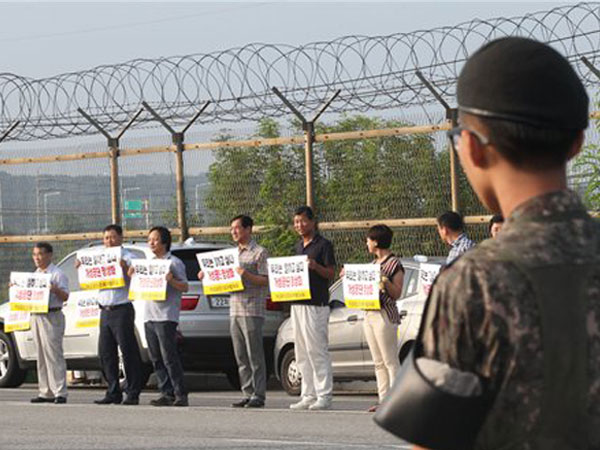
South Korean owners who run factories in the stalled South Korea and North Korea’s joint Kaesong Industrial Complex hold signs as they demand South Korean government and North Korean authorities normalize the operation of the joint industrial complex before South Korean delegation leave for North Korea’s Kaesong city for a meeting, at the Unification bridge in Paju near the border village of Panmunjom, South Korea, Wednesday, Aug. 14, 2013. North and South Korea will meet Wednesday to hold talks on restarting a joint industrial complex at Kaesong. The letters cards read “We want to normalize the operation of the joint industrial complex.” AP
PAJU, South Korea — Officials from North and South Korea resumed talks Wednesday over the fate of a shuttered factory park the rivals jointly ran until Pyongyang pulled out its workers in April.
The industrial complex just north of the heavily armed border in Kaesong, North Korea’s third-largest city, was the last symbol of cooperation between the Koreas until Pyongyang halted operations during a torrent of threats that included vows of nuclear strikes on Washington and Seoul.
Last month, six rounds of talks aimed at reopening the complex went nowhere; the last round ended in a scuffle between rival delegates.
Ties have improved somewhat between the Koreas in recent weeks, and North Korean media have published recent articles expressing eagerness for better relations. But there’s still skepticism the Koreas can settle their differences and put aside the animosity that had both countries trading threats in March and April.
Seoul has been pushing for Pyongyang to provide guarantees that it won’t unilaterally shut down Kaesong when tensions rise again.
The industrial park combined South Korean initiative, capital and technology with cheap North Korean labor. It was also a rare source of hard currency for North Korea, though the economically depressed country chafed at suggestions that it needed the money Kaesong generated.
The talks come a day before a holiday in both Koreas that celebrates independence from Japan’s 1910-1945 colonial rule. Next week Seoul and Washington plan a massive joint military drill. Pyongyang used a previous routine drill between the allies, along with U.N. sanctions over its February nuclear test, to justify its outburst of threatening rhetoric in March and April.
The decade-old industrial park had survived previous periods of tension, including attacks blamed on Pyongyang that killed 50 South Koreans in 2010, and the shutdown of other big cooperation projects
By the end of 2012, South Korean companies had produced a total $2 billion worth of goods during the previous eight years.
North Korea is estimated to have received $80 million in workers’ salaries in 2012, an average of $127 a month per person, paid in U.S. dollars, according to the Unification Ministry.